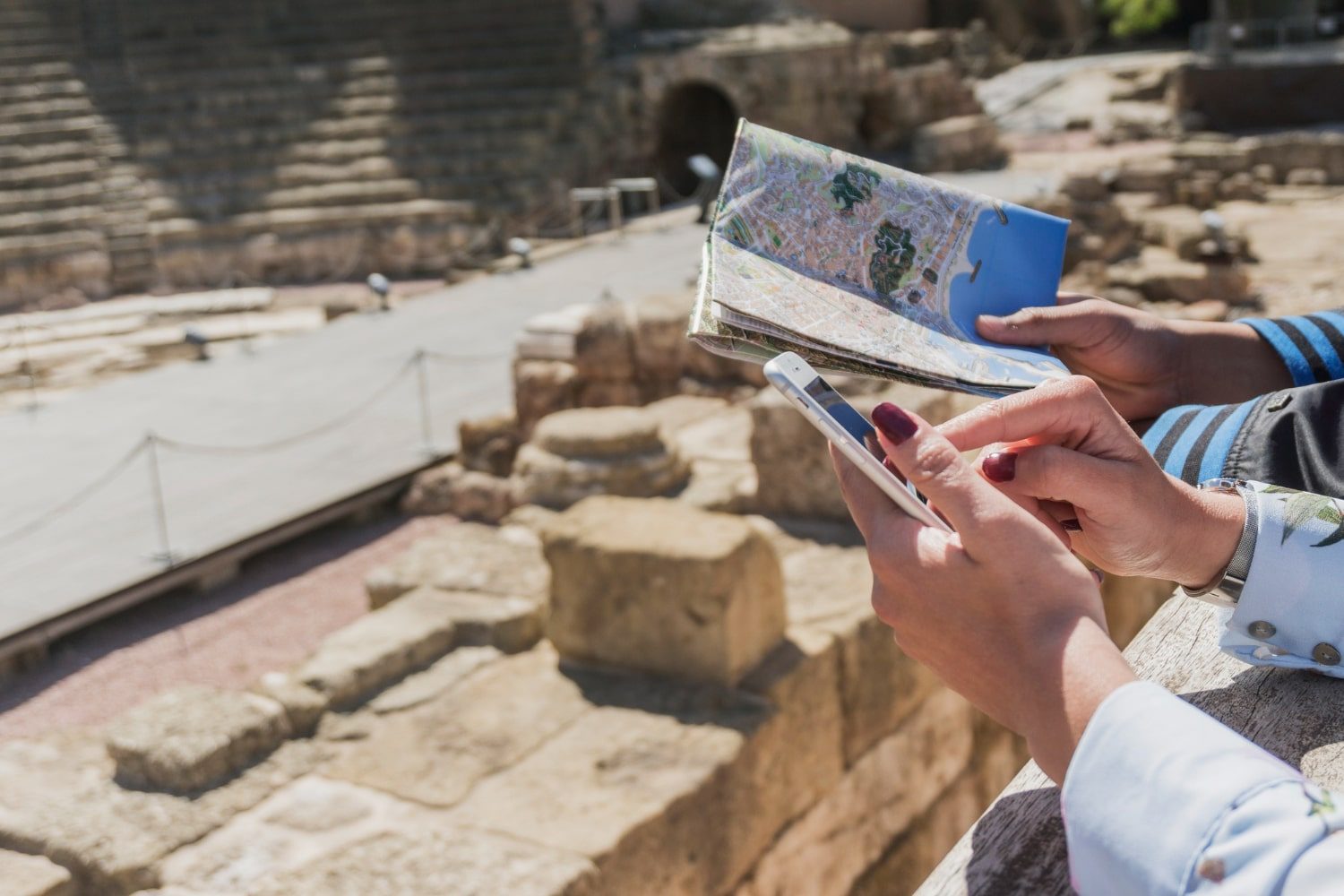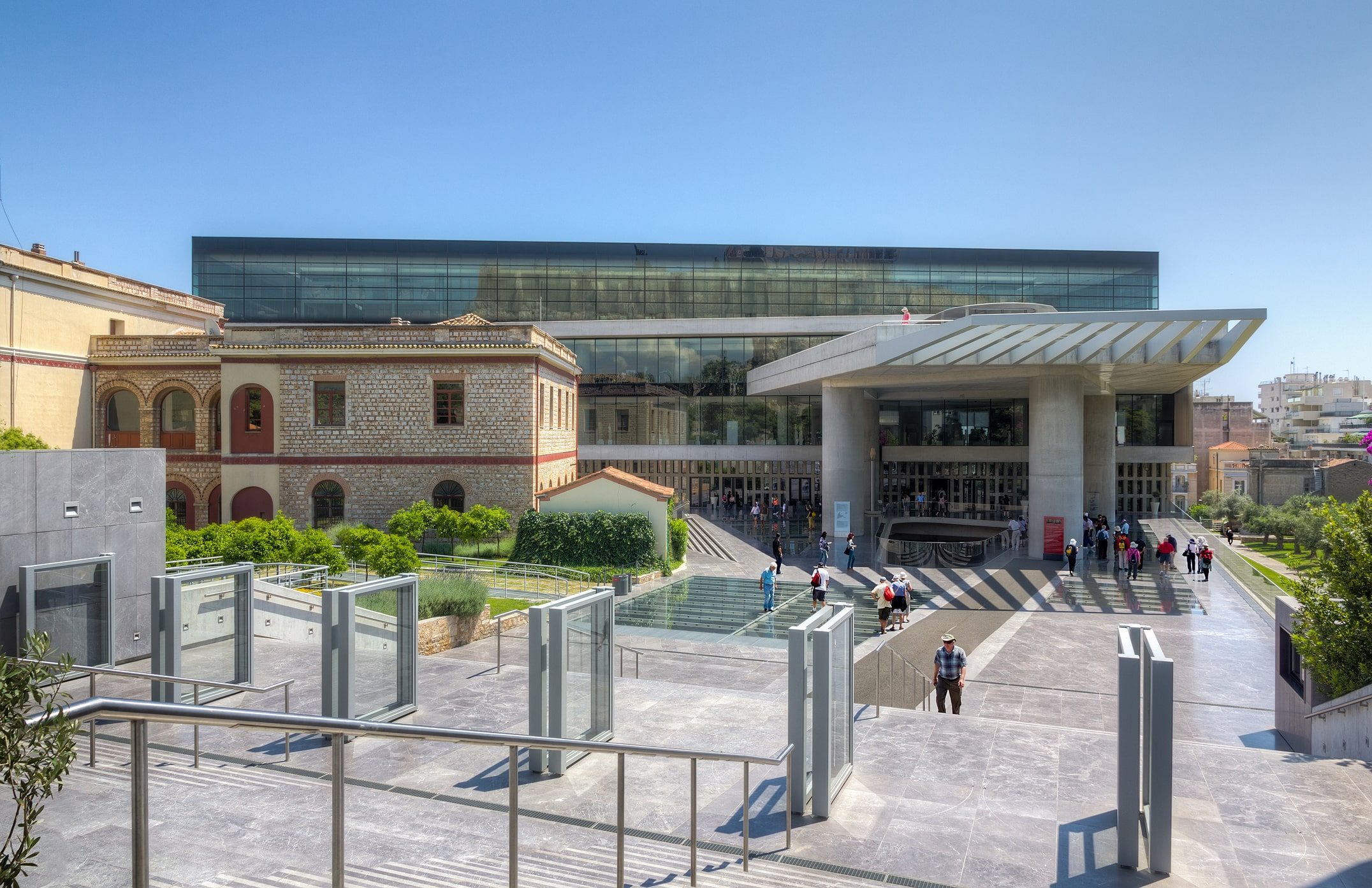The Ultimate Athens Travel Guide

Athens, the illustrious capital of Greece with a tapestry of more than 5,000 years of history, unfurls its magic piece by piece. With this ultimate Athens travel guide, you will have the chance to be a part of an exhilarating journey. You can commence with a visit to the iconic Acropolis and the esteemed Acropolis Museum to behold the revered ancient treasures. Subsequently, you can walk through the charming narrow streets of Plaka or Psiri, engaging in lively encounters with the locals. If you visit Athens in the spring or autumn, you are certain to have a spectacular time. Even a mere three days in Athens are enough to experience the time of your life.
As we can see, there are a lot of things to see and do in Athens. Let’s dive into the complete Athens travel guide to this mesmerizing and historic city in Greece.
Things to see and do in Athens

Athens, a city known for its rich culture and historic significance, is a time capsule of classical civilization. Immersing yourself in the Acropolis Museum, the National Archaeological Museum, and a stroll through the quaint Anafiotika neighborhood will transport you back through the annals of time. Some of the most important must-sees in Athens include:
Visit the Acropolis

The Acropolis, a monumental 5th-century BC citadel perched above the vibrant capital of Greece, is a testament to the city’s ancient glory. The Acropolis hilltop is home to a collection of significant historical structures and ruins, including the grand Propylaea, the sacred Temple of Athena Nike, and, most notably, the iconic Parthenon. Recognized as a UNESCO World Heritage Site, it stands as an indispensable visit. Moreover, during the summer months, a variety of plays come to life in the ancient Odeon of Herodes Atticus. Admission is approximately 20 euros per person, or 30 euros for a comprehensive 5-day pass that grants access to numerous other archaeological wonders. For those desiring a deeper exploration, a guided walking tour is available for around 50 euros. Finally, to elevate your visit, Greece Insiders offers exclusive private experiences of the Acropolis, ensuring a personal and unforgettable encounter with this cornerstone of ancient history.
Visit the Acropolis Museum

The Acropolis Museum inaugurated in 2009, resides in a sleek, contemporary edifice, meticulously crafted to showcase the archaeological marvels within. The museum’s centerpiece is a striking glass floor, inviting you to walk above the remnants of an ancient Athenian neighborhood. Here, you’ll have the opportunity to encounter over 4,000 unearthed treasures, including exquisite sculptures, intricate pottery, and a myriad of other historical artifacts. Admission fees start from 10 euros.
National Archaeological Museum

A visit to Athens would be incomplete without exploring the esteemed National Archaeological Museum. Established in the 19th century, this museum is a sanctuary for one of the most comprehensive collections of ancient Greek artifacts in the world. As you wander through its grand halls, you’ll be greeted by five primary permanent collections, encompassing a vast array of prehistoric relics, masterful sculptures, delicate metalwork, an array of vases, and minor arts, along with Egyptian and Cypriot antiquities. Among the museum’s most astonishing exhibits is the 2,000-year-old Antikythera mechanism, often hailed as the world’s first analog “computer”, retrieved from the depths of a shipwreck. Allocate at least a half-day to immerse yourself in the wonders housed here.
Hike in Lycabettus

Steeped in myth, Mount Lycabettus stands as a towering testament to the ancient Greek legend of the goddess Athena, who is said to have placed this limestone giant amidst the city. When the weather is nice, you can enjoy a beautiful hike up the 277-meter hill, the zenith of Athens. The panoramic views from this vantage point are simply breathtaking. At the peak, treat yourself to a cool, refreshing drink at the café, and if your timing is right, catch an exhilarating concert at the open-air theater that comes alive in the summer months.
Walk around the historic sites
In the heart of Plaka, also known as the “Neighborhood of Gods,” you’ll find yourself wandering amidst the ancient ruins of old Athens. Nestled near the Acropolis, this area is considered the most enchanting part of the city. Here, you’ll discover the timeworn splendors of the Ancient Agora, the Roman Agora, the majestic Olympieion, Thisio, and Kerameikos. During your visit, seize the opportunity to spend a magical evening meandering through these sites, where history whispers in every corner.
Walk through Anafiotika
Built in the 19th century, Anafiotika is a quaint neighborhood perched on the northern slopes of Acropolis Hill. Ideally situated near the Agora entrance and hovering above the charm of Plaka, it remains a serene oasis, untouched by the city’s hustle and bustle. This picturesque location, with its whitewashed walls, shuttered windows, and charming little sidewalk eateries, exudes the idyllic vibe of the Greek islands. As you walk around this area, you’ll find yourself enveloped in a timeless tranquility, where it feels as if the world has paused just for a moment.
What else can you see and do in Athens?

Athens is a city celebrated for its rich cultural and historic charm. The renowned Acropolis Museum, the prestigious National Archaeological Museum, and a stroll through the picturesque Anafiotika neighborhood are gateways to the city’s storied past. Among the essential must-sees in Athens, include:
- Take a guided walking tour around Athens: A walking tour, particularly on your first day in the city, will offer a delightful introduction to the locations of the ancient archaeological sites. This exploration can also be part of an Athens romantic getaway.
- Experience Varvakios Agora (Athens Central Market): Step into this bustling 19th-century market where you can savor Greek delicacies, like olives, Greek meats, and feta cheese. It’s a vibrant hub open every day except Sunday, from 7 am to 6 pm.
- Visit the Temple of Poseidon Cape Sounion: Dedicated to the sea god Poseidon, this ancient temple once offered a welcoming sight to sailors returning home. Nearby, you will stumble upon the pristine beaches of Legrena and Lavrio, and the sunset from this vantage point is simply breathtaking.
- Discover the Kanellopoulos Museum: Housed in an elegant building dating back to 1884, this former palace showcases a rich collection of around 6,500 objects once belonging to the affluent Kanellopoulos family. The array includes exquisite jewelry, historical weaponry, clay and stone vases, Byzantine art, miniature figurines, and antique furniture.
- Visit the Tower of the Winds (Aerides): This unique octagonal tower (Tower of the Winds), constructed by Andronicus in the first century BCE, served as a multifunctional timepiece – a water clock, compass, weather vane, and sundial. It’s widely acknowledged as the world’s first meteorological station.
- Hang out in Psiri: Revitalized for the 2004 Olympics, this quaint district just north of Plaka is a melting pot of culture and nightlife, boasting an eclectic mix of pubs, nightclubs, tavernas, cafes, and restaurants.
- Hike the Filopappou Hill: Offering one of the most stunning panoramic views of the Parthenon, this hill lies just across from the Acropolis. It takes around fifteen minutes to hike up the hill through a landscape dotted with ruins and historical sites.
- Explore the Nike Temple of Athena: Perched atop a citadel that once guarded the Acropolis’ entrance, the temple dedicated to Athena Nike is situated in the southeast corner of the hallowed rock. The classical temple, built between 426-421 BC by the esteemed architect Kallikrates, stands on the site of previous temples dedicated to Athena Nike.
- Discover the Propylaea Athens: On the western slope of the Acropolis hill, where the gate of the Mycenaean defense formerly stood, the Propylaea of the Parthenon were constructed. This gate was most likely constructed to strengthen the Acropolis’ defenses. The name of this entrance honors French archaeologist Ernest Belule, who discovered it behind Turkish fortifications.
- Witness the Easter Vigil: If you find yourself in Athens over the Easter weekend, make sure not to miss this fascinating procession of vigils. Each year on Good Friday, tens of thousands of people form a candle-lit march throughout the city. Go to Lycabettus Hill and follow the masses up to the church of St. George, a truly captivating experience.
Is Athens a walkable city?

Yes, Athens is indeed a walkable city. Regarded as one of the most pedestrian-friendly cities in Greece, Athens, much like other European capitals, offers the best sightseeing experiences on foot. By strolling through its streets, you’ll have the opportunity to fully immerse yourself in the city’s vibrant culture and experience the authentic day-to-day life of the locals.
How can you get around Athens?

Besides walking, there are many ways you can get around Athens, such as using public transport, taking a taxi, or even cycling around the city. Below are all the ways, you can explore Athens at your leisure:
Public transport
Public transport in Athens is affordable and reliable. The subway is the easiest and fastest way to roam around. Additionally, a network of trams, buses, and suburban railways are at your service. There are also many trams, buses, and suburban railways. Tickets can be used on all types of public transport, cost about 1.20 euros, and are valid for 90 minutes.
For more extensive travel needs, there’s the unlimited pass at approximately 4.10 euros, or a five-day pass for 8.20 euros, offering great value for more extended stays. Also, the express bus service from the airport is priced at 6 euros each way. Alternatively, the subway, costing 9 euros each way, will conveniently transport you to the city center in about an hour.
Bicycle
For the adventurous souls unphased by Athens’ bustling streets, bike rentals offer a delightful and eco-friendly way to explore the city. Typical bike rentals begin at around 12 euros per day, with electric bicycles available at a higher rate for an even smoother ride.
Taxi
Taxis provide a swift and convenient means of transportation, though they can be pricier. When opting for a taxi, ensure that the meter is running – it’s a legal requirement. Be vigilant with taxi drivers, as some may attempt to overcharge. The meter should display “1” during daytime hours. The “2” setting, indicating double rates, applies only from midnight to 6 a.m. Finally, it has become a mandatory legal requirement for all taxis to be equipped with a POS (Point Of Sale) system effective from January 1st, 2024.
Car rental
Renting a car can be an economical option for those looking to venture beyond the city limits. It’s an ideal choice for exploring the wider region. Drivers are required to be at least 21 years old and possess a valid driver’s license for a minimum of one year, making it a practical choice for many travelers.
How many days in Athens is enough?
If you want to visit Athens, 1-3 days in the city are enough, but this number of days depends on how much time you need to arrive in the city. The city’s key attractions, including the awe-inspiring Acropolis, the informative Acropolis Museum, and the historic treasures scattered around Plaka, can be explored in a single day with strategic planning. If Athens serves as your gateway to further Greek adventures, such as island-hopping, a one-day visit can capture the essence of the city. However, to delve deeper into Athens’ captivating tourist spots, a leisurely three-day stay is recommended. Regardless of your time frame, embarking on a guided tour will enrich your experience, offering a taste of the city’s vibrant culture and delectable food scene.
Remember: It’s crucial to factor in the time required for travel between destinations. So, if you travel from a long distance (for example USA) you might find it necessary to allocate a few additional days to fully complete your trip.
What is the best month to visit Athens, Greece?
Reservations for Athens should be made from March through November, with the best times to visit being in the spring and fall. This is because the weather during these months is not too cold or hot, with the days being predominantly sunny. Additionally, the city is less crowded during these seasons, making it easier to find attractive deals on hotels and airfare, unlike the busy summer period. If you want to summer travel to Greece, you should probably equip yourself with lots of sunscreen.
However, visiting in the winter season can also offer its unique charm. Winter in Athens is mild, with the average temperature being 10°C, thanks to Greece’s advantageous location along the Mediterranean. The months between June and August are known for the high temperatures and the large number of tourists, so sightseeing can get a bit challenging at times. Nevertheless, a winter holiday visit to Athens can be delightful, especially at Christmas, as you can take part in Greek traditional holiday festivities.
How can you save money in Athens?
As in other European cities, in Greece, there are many ways that you can risk overspending. If you would like to travel on a budget, consider some of these savvy tips:
- Opt for off-peak seasons: Avoid planning your Athens adventure during the summer high season when flights and accommodations tend to be pricier.
- Explore Athens on foot: Athens is a remarkably walkable city, especially in the central areas. Exploring on foot not only helps you save money on transportation but also allows you to uncover the city’s hidden gems. Invest in a comfortable pair of walking shoes, and you’ll be all set to embark on a memorable journey.
Extra tip: For guaranteed savings, consider booking your trip several weeks or even months in advance. This can lead to more budget-friendly options for your Athens escapade.
What can you eat in Athens?

Athens’ culinary scene is a vibrant tapestry of flavors, offering a wide array of options to satisfy every palate. From charming family-owned eateries serving up traditional recipes to upscale dining establishments nestled in the chic Kolonaki district, your taste buds are in for a treat. Whether you crave the delightful simplicity of gyros and moussaka or the exquisite complexity of gourmet Greek cuisine, Athens has it all.
For an authentic dining experience away from the tourist hubs and a glimpse into the locals’ preferences, be sure to explore neighborhoods like Koukaki, Mets, and Pangrati. One important cultural note: Greeks typically enjoy their dinners around 9 p.m., so plan your dining accordingly.
Want to gauge a restaurant’s pricing? Look no further than the salad and bread test. If the bread cover costs around 1 euro and salads are priced between 7-8 euros, you’re in for an affordable dining experience. For establishments where the bread cover is approximately 1.5 euros and salads range from 8-9 euros, expect moderate prices. For other price ranges, you might be venturing into the realm of upscale dining.
Is Athens safe for tourists?
Athens is a safe city. A great part of the city is pedestrianized, and there are usually a lot of people walking around. While navigating crowded spaces, it’s advisable to remain vigilant against pickpockets. Solo travelers can enjoy solitary moments at restaurants, bars, and iconic landmarks without a hint of apprehension.
For female solo travelers, Greece emerges as a secure haven. The consensus among many female visitors is that Greece, as a whole, welcomes solo female travelers with open arms, provided that standard precautions are observed.
How not to be rude in Greece?
The Greek people are known for their hospitality and generosity. This hospitality goes back to ancient times when people believed that a guest who came to your doorstep could be a god in disguise. Moreover, Greeks are very generous in extending invitations to social events. An invitation to have coffee with them may lead to an invitation to dinner. If you want to be polite to Greeks and not seem rude, consider the following guidelines:
- Maintain eye contact when you first meet a person.
- A handshake is the most common greeting in Greece. It is exchanged between men, women, and even children.
- Familiarize yourself with the prevalent Greek greeting, “Ya sas”, which translates to “Hello”.
- It is part of the culture of Greece that someone accepts generous offers from others. If you refuse something, it is not unlikely that a Greek person will insist on accepting what is offered.
- Avoid criticizing Greek culture and the nation. Even though, Greeks tend to complain about their country, they are still very proud of Greece and its cultural contributions to the world. Criticizing these aspects may come across as impolite.
- Greek people use verbose and theatrical language. Sometimes, this communication style can seem a bit exaggerated. Although, It is also very common for people to merge the discussion with other thoughts they have. In cases like these, interpretation is common, but it’s advisable to avoid this practice whenever possible.
Is Athens worth visiting?
Yes! Athens is worth visiting. Athens is a top-rated destination adorned with a wealth of historical sites. From the iconic Acropolis to the enchanting streets of Plaka and Psiri, each location exudes a distinctive ambience that promises to transform your perspective on the world.
This Athens travel guide invites you, to embark on an extraordinary journey, allowing you to tailor your stay to your desires and create remarkable memories. If you choose to explore this captivating city during the enchanting seasons of spring or autumn, be prepared to fall deeply in love with its charms. Reach out to us, and let us assist you in curating the ideal itinerary for your perfect trip.
Feeling Ready?
From our blog

Romantic things to do in Greece: A couple’s guide

Weather in Greece in November

Weather in Greece in October: Your Ultimate Guide

Best Greek Island for teenage families to explore this summer

What to See in Greece: Ultimate Travel Guide

The Ultimate Guide to Greece Family Vacation

Visiting Greece in December: Complete Travel Guide

Best Resorts in Greece for Families: Your Ultimate 2024 Guide

Weather in Greece in September: Ultimate Travel Guide
